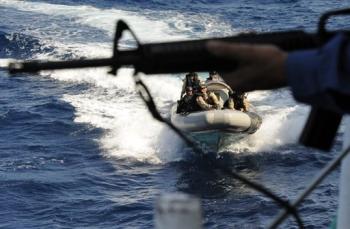
A tense standoff has developed in waters off Somalia over an Iranian merchant ship laden with a mysterious cargo that was hijacked by pirates. Somali pirates suffered skin burns, lost hair and fell gravely ill “within days” of boarding the MV Iran Deyanat. Some of them died.
Andrew Mwangura, the director of the East African Seafarers’ Assistance Programme, told the Sunday Times: “We don’t know exactly how many, but the information that I am getting is that some of them had died. There is something very wrong about that ship.” The vessel’s declared cargo consists of “minerals” and “industrial products”. But officials involved in negotiations over the ship are convinced that it was sailing for Eritrea to deliver small arms and chemical weapons to Somalia’s Islamist rebels.
The drama over the Iran Deyanat comes as speculation grew this week about whether the South African Navy would send a vessel to join the growing multinational force in the region. A naval spokesman, Lieutenant-Commander Greyling van den Berg, told the Sunday Times that the navy had not been ordered by the government to become involved in “the Somali pirate issue”. About 22000 ships a year pass through the Suez Canal and the Gulf of Aden, where regional instability and “no-questions-asked” ransom payments have led to a dramatic rise in attacks on vessels by heavily armed Somali raiders in speedboats.
The Iran Deyanat was sailing in those waters on August 21, past the Horn of Africa and about 80 nautical miles southeast of Yemen, when it was boarded by about 40 pirates armed with AK-47s and rocket-propelled grenades. They were alleged members of a crime syndicate said to be based at Eyl, a small fishing village in northern Somalia. The ship is owned and operated by the Islamic Republic of Iran Shipping Lines, or IRISL, a state-owned company run by the Iranian military.
According to the US Treasury Department, the IRISL regularly falsifies shipping documents to hide the identity of end users, uses generic terms to describe shipments and operates under various covers to circumvent United Nations sanctions. The ship set sail from Nanjing, China, at the end of July. According to its manifest, it was heading for Rotterdam where it would unload 42500 tons of iron ore and “industrial products” purchased by a German client. At Eyl, the ship was secured by more pirates — about 50 on board, and another 50 on shore.
But within days those who had boarded the ship developed mysterious health trouble.
But IRISL has denied that — and threatened legal action against Mwangura. The company has reportedly paid the pirates 200000 — the first of several “ransom instalments”, but that, too, has been denied.
The good news is the ransom should go unpaid and the pirates get whats coming to them, the bad news could stem from what was really in the cargo hold and what is China’s involvement?















Given that there is indisputable links between declining pirate numbers and increasing global warming, shouldn’t we view the sudden emergence of all these Somali pirates as good for the environmen?.
harhar somalian politicians bein paid off too with the ransoms i suspect ,more money circulated for the booming somalian economy